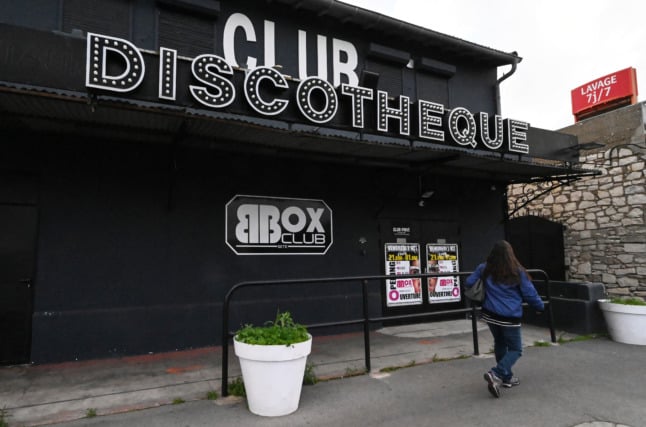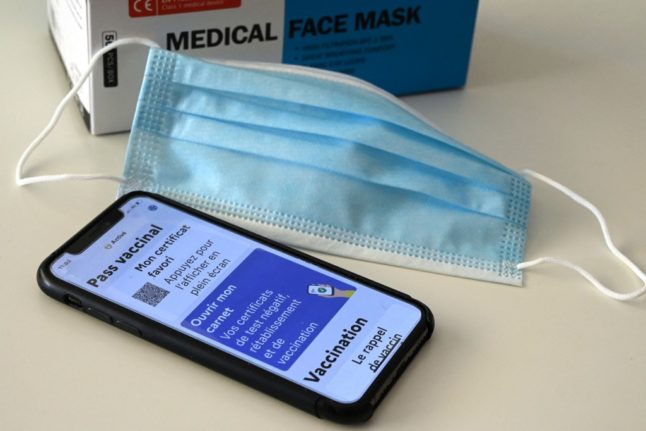Main info:
- Nightclubs to close for four weeks
- More home-working encouraged but not enforced
- Stricter rules in schools around masks and canteens
- People encouraged to limit gatherings over Christmas
- No limits imposed on bars, restaurants
- Over 65s can get booster without appointment
particular, Prime Minister Jean Castex said Monday.
Whilst no new restrictions or capacity limits were brought in for bars and restaurants the government did decide to tighten some rules including around night life, with clubs and discotheques to close for four weeks from Friday 11th December.
PM Jean Castex and Health Minister Olivier Véran held a press conference at 7pm on Monday to update the country to the health situation.
“The virus is spreading throughout the country… but the situation is not the same as last year,” said Castex. “This fifth wave requires measures of vigilance because the virus is circling at speed.”
But he said to introduce a lockdown or curfew at this point would be “disproportionate”.
Limit social interactions
Castex called on people to “lift the pedal” on social interactions such as office parties as
the year-end holidays approach.
And health passes proving Covid vaccination or inoculation will now be required for eating in reserved zones at outdoor Christmas markets, he said.
“The situation demands an individual as well as a collective effort,” he said
Vaccination policy
As far as booster doses are concerned, over 65s will now be able to simply turn up to vaccination centres to receive a shot, and will not require an appointment. The same goes for anyone who want to receive their very first dose of anti-Covid vaccine.
On the sensitive subject of vaccines for 5 to 11 year olds, the French PM said the most vulnerable children such as those who are overweight could access the Covid jab from December 15th.
For all other children the government will wait for scientists and health chiefs to give their verdict but that may happen by the end of the month.
Castex emphasised the need for widespread vaccination and booster shots for those who have already had the jabs, and encourage working from home to avoid the need for curfews or travel restrictions ahead of the holidays.
Workplace recommendations
The French PM called for more home-working over the Christmas period and for festive parties and other social gatherings to be delayed until after the fifth wave has passed.
He said companies should ask employees to work form home two to three days a week where possible and limit meetings. If businesses do not respect this recommendation, it may become law.
“All eligible companies who can impose home-working should do,” Castex said.
Schools
The government has decided not to bring forward the Christmas holidays by a week but will strengthen its Covid-19 response in schools, moving from level 2 to level 3 on a scale set out at the beginning of the school year.
Such a move makes wearing facemasks indoors and outdoors compulsory from primary school age, imposes stricter rules in school canteens, and adds additional measures for physical and sporting activities.
At the end of November, Education Minister Jean-Michel Blanquer made a number of changes to the Covid-19 protocol in French schools, which are aimed at keeping as many classes open as possible.
What is the current picture?
A total 42,252 new cases of Covid-19 contamination were detected in the past 24 hours, with 49 deaths, according to Santé publique France. Over the last seven days, the average of new daily cases stands at 42,459, compared to less than 28,000 a week ago.
More than 11,500 people are now hospitalised with the virus in France, including 2,066 in intensive care. The influential Pasteur Institute has forecast that the number of Covid patients in ICU could pass 3,000 by December 12th.
But appointments for vaccinations are proving hard to obtain in Paris and other large cities amid the rush for boosters, according to the Doctolib reservation site.
READ ALSO How to get a Covid-19 booster dose appointment in France
Some 10 million people have already had the booster jabs.
France has confirmed only 25 cases of the new Omicron variant but officials. The fifth wave is expected to peak in January at the earliest.



 Please whitelist us to continue reading.
Please whitelist us to continue reading.
So masking primary school children OUTDOORS is going to bring down cases? The definition of insanity is doing something over and over again expecting a different outcome. What a travesty. Leave our children out of this.
In fact, yes! That’s a very good measure. Children may not get gravely sick but they still get sick and spread it to everyone else by touching and licking everything in their path. and then what does it even mean “Leave our children out of this?”. What THIS? Please stop repeating phrases that make no sense.
As I understand it, ‘lisakpetrovic’s point was the wearing of masks OUTDOORS wasn’t going to stop spread, which as she interprets it, and I agree, has never worked. If children (I would specify young children) spread diseases it is more likely to be by ‘licking and touching’, as you put ‘sigh’, or because as children are by definition immature they won’t necessarily use masks effectively. I don’t think it is fair or reasonable to expect children to wear masks outside as part of ‘this’, ie the whole response to Covid, their physical and mental health when growing is very important too, and looked at another way, being allowed to play freely outside and be relaxed rather than fearful and restricted, will reinforce their immunity and make them less likely to catch and spread diseases. Our children will develop immunity for humanity in the future against this virus and its future variants, so it’s good to remember they are helping and not just ‘infectious agents’!
Where is the evidence you are forming your opinion on that wearing masks outside do not stop the spread of Covid? The Delta variant that sparked in Sydney and has run rampant began with a solitary case in an outdoor setting. The CDC recommends wearing masks outside particularly if you are going to be less than 6ft away from someone else…and if you’ve ever seen kids play in a playground they are all over each other – they couldn’t stay 6ft away if they tried! This isn’t opinion, this is the simple science of dispersal via aerosols and droplets! Why is the wearing of masks perceived to be injurious to their “physical and mental health”? My grandson is much more perturbed by the prospect of being coughed at in the face (as he was this morning at school) and having to face another ghastly PCR test. The whole purpose of using masks to reduce the spread is a scientifically proven method by which we can hope to keep classes open, children engaged and painful swabs out of little noses!
Hallo FarahV, good to enter into dialogue with you. I am sorry Covid is now becoming an issue in Australia, it seems no-one can escape this disease.
After years of experience here in Europe, I am English living in France for over 25 years, we have been through much, including times when masks were deemed scientifically not not useful and were discouraged. I’ve become more wary about what is ‘scientifically proven’ and more aware of policy or law which is decided on with the best available scientific interpretations so far. Scientific evidence is always evolving, that is normal as we ask new questions and find out new things, and depends on how we ask questions, what we concentrate research on, and many other things that influence the data we reap. There is room for debate and interpretation within the scientific world, and even more so when making political decisions concerning our social behaviour and medical choices. So I feel justified in having an opinion.
I am not going to enter into a battle of evidence for and against the use of masks inside or outside, I have found there are scientifically based cases made for both. Masks IF correctly worn, not touched, removed carefully, stored carefully replaced regularly etc by medical staff and responsible adults can prevent excess droplets infecting others and reduce viral load (smaller particles escape) especially important in enclosed and airless spaces. In my experience, with my own and my friends’ children/grandchildren, from the world of teachers, (and I am talking about France so perhaps the culture is different) playing outside freely is a vital way to unwind from the restrictions indoors, to have some sort of normality and reduce anxiety, and develop healthy mindsets and bodies. Of course the risks and benefits and other factors have to be weighed up. Of course every child is different and each family has its own way of dealing with these challenging times, I hope your grandchild’s school finds a healthy and supportive way forward, best wishes to you.
Wearing masks outdoors unless in a crowd is pointless anyway!
Do single vacinated +12 to 17years need to do a daily test to go on the ski lifhts or enter restaurants?
Yes, at a testing station so that the get access to the health pass for 24 hours
Can you still buy a weekly ski pass if only vaccinated with one dose?
I have the same question. My contact in resort (ski instructor) isn’t sure how it’s going to work yet (spot checks for health pass, checks every lift queue, linked to lift pass etc) so we haven’t pre-purchased ski passes this trip.
I’m watching this news with some trepidation, as I return to France, this time as a visitor instead of someone with a Carte de Sejour. I return to Nice on December 14th from the US, have the booster shot, and will get a rapid test this Saturday. I watch your news as often as you post and thank you for keeping us all up to date.